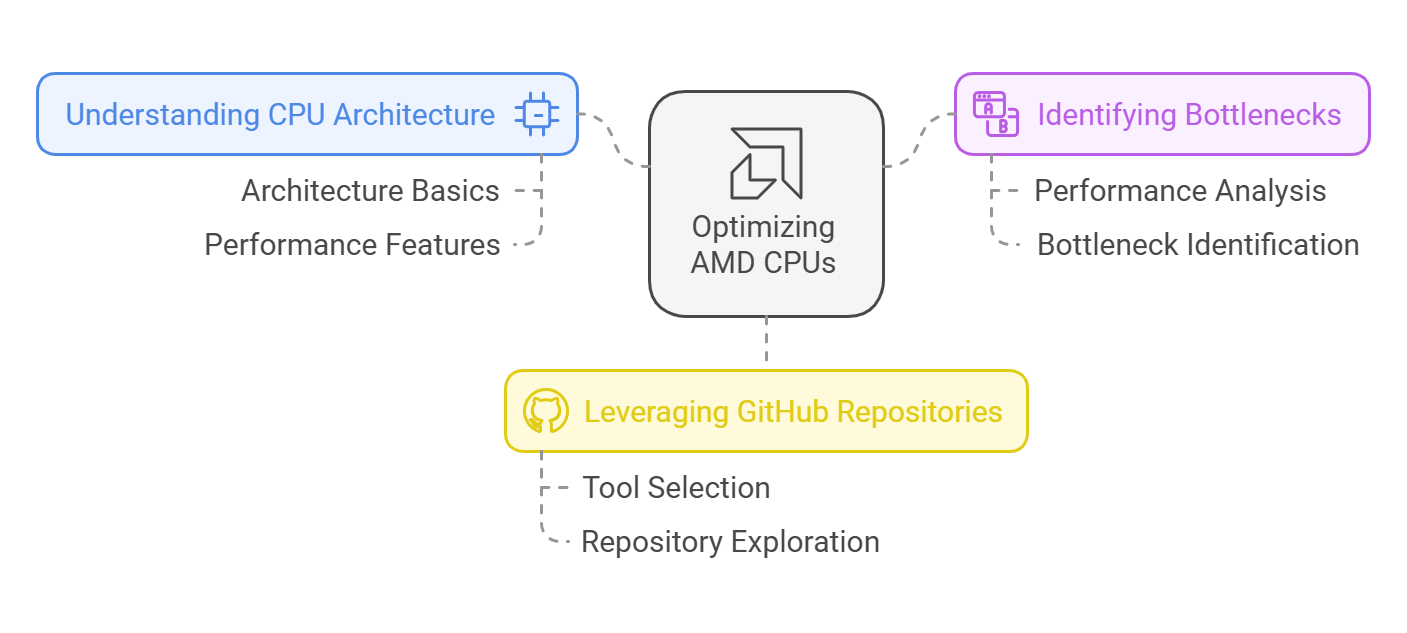Learn how to optimize your AMD CPU using tools and projects from GitHub. Enhance performance through overclocking, memory optimization, and power management.
Optimizing AMD CPUs Using GitHub: A Guide for Developers
In the ever-evolving world of computing, processor optimization plays a crucial role in maximizing performance. AMD (Advanced Micro Devices) CPUs, known for their impressive performance and affordability, have become a popular choice among developers, gamers, and enthusiasts alike. Whether you’re developing applications, managing large-scale systems, or simply optimizing your gaming setup, optimizing AMD CPUs can yield significant improvements in performance.
In this article, we’ll explore how to optimize AMD CPUs using tools and projects available on GitHub. We will focus on understanding CPU architecture, identifying bottlenecks, and leveraging GitHub repositories to fine-tune your system’s performance.
Understanding AMD CPU Architecture
AMD processors use a different architecture compared to their main competitor, Intel. AMD’s recent Ryzen and EPYC series processors feature a Zen microarchitecture, which introduces various enhancements like higher core counts, better power efficiency, and better multithreading performance. These features make AMD CPUs especially attractive for workloads that require parallel processing, such as video rendering, 3D modeling, and server-side applications.
To optimize your AMD CPU, it’s crucial to understand the following key features of the architecture:
- Core/Thread Count: AMD Ryzen CPUs offer impressive core and thread counts, especially in the higher-end models. Applications that can utilize multiple threads benefit from the increased processing power, making AMD an excellent choice for multi-threaded workloads.
- Precision Boost: AMD’s Precision Boost is an automatic overclocking feature that increases CPU speed when needed, providing additional performance during demanding tasks.
- Infinity Fabric: AMD’s Infinity Fabric is a high-speed interconnect that links the various components of the CPU, such as the cores and memory. Optimizing Infinity Fabric can improve communication between these components and lead to better performance in certain workloads.
- Memory Optimization: Memory speeds and latency have a direct impact on AMD’s Ryzen processors due to the way the memory controller is integrated. Tuning memory settings can help improve performance in data-heavy tasks.

Understanding GitHub Branch Symbols
Optimization Techniques for AMD CPUs Using GitHub Projects
GitHub is a powerful platform where developers share tools, scripts, and projects. Many GitHub repositories are dedicated to optimizing AMD CPUs, enhancing system performance, and providing utilities for overclocking. Here are some key GitHub projects and techniques for optimizing AMD CPUs:
1. AMD Ryzen Master Tool
AMD provides its own utility, Ryzen Master, which allows users to monitor and adjust their CPU’s clock speeds, voltages, and other critical settings. However, there are open-source tools available on GitHub that can complement this software by allowing more fine-grained control.
One popular GitHub repository is RyzenController, an open-source project that offers a simplified interface for controlling your CPU’s performance. RyzenController helps users adjust frequency, voltage, and power settings, enabling fine-tuning without the need for advanced BIOS tweaks.
2. Overclocking with PBO (Precision Boost Overdrive)
Overclocking is a popular method for enhancing CPU performance, and Precision Boost Overdrive (PBO) is a feature exclusive to AMD CPUs. GitHub repositories like PBO2 and RyzenTuner allow users to make precise adjustments to PBO, enhancing both gaming and computational performance.
These tools provide automatic overclocking adjustments, ensuring that your system operates at maximum potential without risking instability.
3. Optimizing Infinity Fabric and Memory
Memory and Infinity Fabric optimization can play a significant role in overall CPU performance. Tools like ZenTimings and RYZEN MEMTEST can be found on GitHub. These tools help users fine-tune memory timings and adjust the Infinity Fabric clock to achieve optimal speeds for specific workloads.
Fine-tuning memory speeds is particularly beneficial for gaming and high-performance computing tasks, where every millisecond counts.
4. Power Management and Efficiency
For users focused on power efficiency or those working with mobile devices, PowerLimit tools on GitHub can be invaluable. These tools help users adjust power consumption profiles, making it easier to balance performance with power usage. The Ryzen Power Saving repository offers scripts for optimizing the balance between performance and efficiency, especially for battery-powered devices.
5. BIOS Tweaks and Kernel Modules
A deep dive into the BIOS settings or kernel modules can yield significant performance improvements, especially when dealing with advanced workloads like scientific computing or server optimization. GitHub projects like AMDFirmwareLoader and kernel patches are designed to integrate AMD-specific optimizations into the system’s kernel, providing better resource management and performance gains.
Conclusion
Optimizing AMD CPUs using tools from GitHub is an effective way to squeeze out extra performance, whether for gaming, software development, or server-side applications. With a variety of open-source projects available, developers can adjust settings ranging from overclocking to memory optimization and power management. By leveraging these tools and techniques, you can unlock the full potential of your AMD processor.
Optimizing AMD CPUs Using GitHub: A Guide for Developers
FAQs
1. What is the best way to overclock an AMD CPU?
The best way to overclock an AMD CPU is by using tools like Ryzen Master or open-source projects on GitHub like RyzenController. Ensure you monitor temperatures and stability during the process.
2. Can I optimize my AMD CPU for gaming?
Yes, optimizing your AMD CPU for gaming involves tweaking memory speeds, adjusting Precision Boost, and overclocking using tools like PBO2.
3. How does Infinity Fabric impact AMD CPU performance?
Infinity Fabric is crucial for communication between cores and other components. Optimizing it helps improve performance, especially for workloads that require high inter-core communication.
4. Is it safe to use third-party tools for AMD CPU optimization?
Using third-party tools can be safe if they come from reputable sources like GitHub projects with active communities and contributors. Always ensure you monitor system stability when making adjustments.
5. What is the role of Precision Boost Overdrive in CPU optimization?
Precision Boost Overdrive (PBO) automatically overclocks your CPU when needed, boosting performance for demanding tasks. Tools like RyzenTuner help manage PBO settings for optimal performance.

